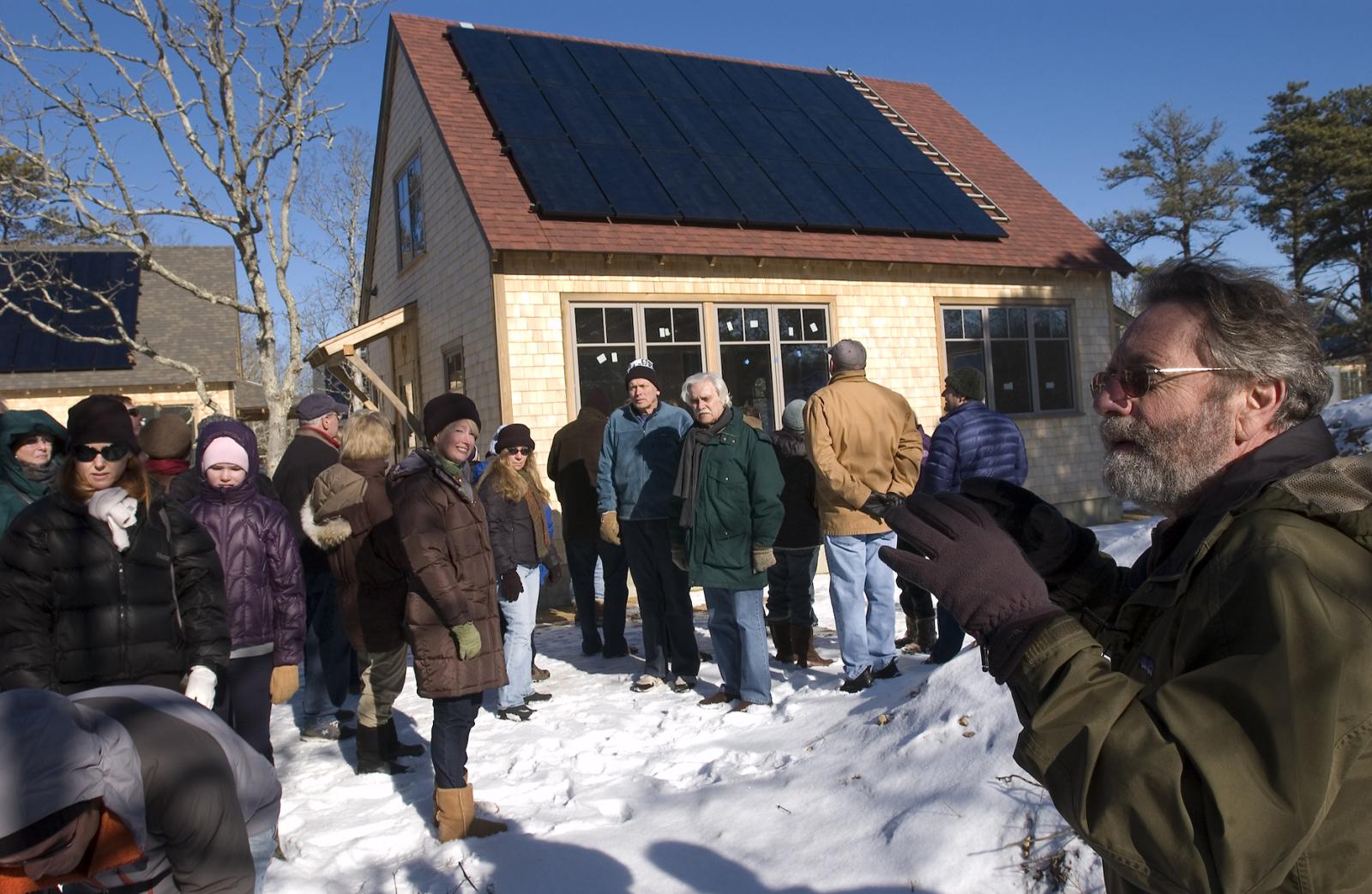Dozens of curious Islanders turned out to take part in Saturday’s green tour of the affordable housing project under construction at 250 State Road in West Tisbury. The sun was shining on a bitterly cold day as members of the Island Housing Trust and South Mountain Company led visitors through three solar homes in various stages of completion.
After securing several acres of land in West Tisbury in 2007 as part of a joint purchase with the Martha’s Vineyard Land Bank, the Island Housing Trust set out to construct the small neighborhood of green affordable homes — energy-efficient, long-lasting, single-family homes for lower-income Island families. Under a special permit by the planning board that allows for greater density, eight houses are clustered on 3.5 acres.
The $3.1 million project has not been without controversy. Last year local officials took issue with the high cost of the project, especially considering the town’s contribution of $570,000 in Community Preservation Act funding. The trust also awarded the building contract to South Mountain, a company owned by one of their board members, a practice that is permitted for a nonprofit but not necessarily promoted.
The project is slated to be completed by the end of May, and in the last few months of construction, those involved took the opportunity to open up the process to the public, to show friends and neighbors the elements of green building practices and procedures.
The tour kicked off in a crowded upstairs room of one house, which was the least finished and still unheated, as South Mountain president John Abrams spoke briefly about his company’s design and construction project. “In this one, you can really see the bones,” he said. Double wall construction and triple glazed windows help make the buildings air tight. “All of the framing is engineered so that there is very little space taken up, so that most of the space can be filled with insulation . . . these houses are incredibly tight,” said Mr. Abrams.
The tour continued outdoors, focusing on the exterior elements of the homes. “They’re designed to be basically no-maintenance,” said Mr. Abrams. Windows are clad and never need painting, the trim is reclaimed long-lasting cypress that needs no treatment, and pine trees cleared from the building lots were milled for the porch materials. Roofs are installed with solar electric panels funded by a $500,000 grant from the Cape Light Compact. “They’re sized in such a way that if somebody lives carefully and conservatively, they might provide 100 per cent of all their energy needs,” said Mr. Abrams.
The final leg of the tour brought the crowd into the house nearest completion. It was noticeably warmer than the rest. “The heat is working,” said Mr. Abrams, pointing out the air source heat pump that provides both the heating and cooling for the building.
“Essentially the technology is such that it takes the heat from a cool area and moves it to a warmer area,” said South Mountain employee Robert Meyers. “If you think of your refrigerator, that’s sort of what that does.”
Despite being tightly insulated, the buildings also have heat recovery ventilators which run quietly at a very low speed to provide constant ventilation. “You take moisture away from the bathrooms and kitchen and then bring fresh air into the living areas, so you’re controlling all fresh air, all the time,” said Mr. Abrams.
In each basement five meters monitor solar electricity generation. The future homeowners will be responsible for reading the meters monthly and reporting back to South Mountain about the amount of energy made and used. “Over time we’re going to get some really terrific data about what they’re doing,” said Mr. Abrams.
He said South Mountain’s main goal was to steer away from systems that depend on oil or propane and instead heat with electricity, which is cheaper and better for the environment. Even without solar panels, existing buildings can be retrofitted with the electrically powered air source heat pumps. “This is the cheapest way to heat on the Vineyard right now,” said Mr. Abrams.
“We’re actually doing our own monitoring of energy costs, so this past year we have requested from homeowners that we work with on trust land to provide us with authority to get their utility bills,” said trust executive director Philippe Jordi. “We’ll be continuing to do that. In fact in all houses that we’ll be selling, we’ll be requiring the people to provide us with that authorization so that we can continue to track what these costs are, and then really provide benefits to the homeowners as well as the community who has invested in the properties.”
Mr. Jordi said the eight houses, which cost approximately $318,000 per unit to build, will be sold for between $175,000 and $295,000 to qualified applicants. Applications are available at the West Tisbury town hall and the Vineyard housing office in Vineyard Haven.







Comments
Comment policy »